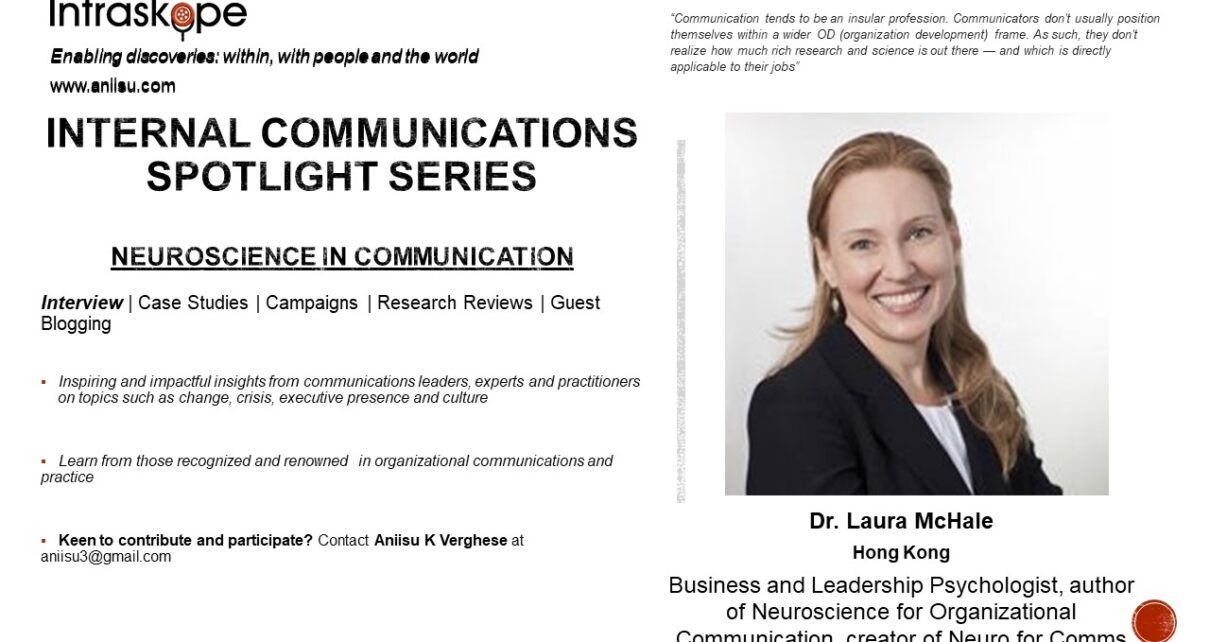Understanding audiences and messaging often falls short when it comes ti truly tapping the full potential of human behavior. Neuroscience provides ways in which management, leadership, and communication can come together seamlessly and in an objective manner. In this chat with Dr. Laura McHale, we learn how to appreciate the nuances of neuroscience in communication.
Gain pointers from this interview to be aware of this growing area of organizational behavior and to become more adapt as communicators. Having a strong understanding of this area also gives an impetus to the standing communicators have among stakeholders.
Welcome to the 27th edition of Intraskope’s Spotlight Series featuring Dr. Laura McHale, a leading business and leadership psychologist, author, and lecturer. She is the founder of Conduit Consultants, a Hong Kong-based organizational consulting firm specializing in leadership, culture, organizational communication, leadership assessments, psychometrics, and neuroscience. She is the author of the acclaimed new book Neuroscience for Organizational Communication: A Guide for Communicators and Leaders (Palgrave Macmillan, 2022) – as well as a creator of Neuro for Comms (please visit: www.neuroforcomms.com). Dr. McHale has a doctorate (PsyD) in leadership psychology in 2019, is a Chartered member of the British Psychological Society, a member of the American Psychological Association, and an EMCC Accredited Coach at the Senior Practitioner level. She has an accreditation in business communication (ABC) from the International Association of Business Communicators. She lives and works in Hong Kong.
In this interview, I spoke to Dr. Laura about the potential for leveraging neuroscience in communications and how communicators can stay abreast of newer trends in this domain.
1. What got you to explore and go deeper into neuroscience in communications?
I fell in love with neuroscience while taking a required course in my doctoral program — quite unexpectedly. I wanted to understand human behavior more deeply in organizations. Neuroscience is showing that the ways we teach management, leadership, and communication are flawed.
2. Why is that so few communicators consider this aspect of communicating better?
Communication tends to be an insular profession. Communicators don’t usually position themselves within a wider OD (organization development) frame. As such, they don’t realize how much rich research and science is out there — and which is directly applicable to their jobs.
3. Where must an internal communicator keen to explore this subject begin from?
My book is a great start, and right now the only one on the subject. My Neuro for Comms program is launching soon: https://www.conduitconsultants.com/neuroforcomms. Be careful of neuromania and neuro-quackery — learning to be a discerning consumer of neuroscience
4. You have spent time as a communicator before becoming a consultant – how different is it to play these two roles from the context of neuroscience?
I was more tactical and hands on as a communicator. As a consulting psychologist, I am more strategic and bigger picture.
5. Most communicators face change or crisis communication situations at work – what aspects must they consider while making change land effectively and resolving crises?
Self-care is critical — especially before and after a crisis or major change. Understanding the psychology of loss and grieving. Engaging in post-traumatic organizational growth
6. If you had one piece of advice for communicators related to adopting neuroscience for communications, what would that be?
Read my book!
Watch this interview with Dr. Laura to learn more.
In the Spotlight on Internal Communications Series, I talk to thought leaders on topics interrelated with internal communications such as culture, crisis, change, executive presence and leadership. The goal is to help unravel why they matter, what can leaders and communicators learn from experts and how we can put insights to practice.
Watch the complete video interview on YouTube or read the complete transcript above.
Missed the earlier episodes? Watch them here: D. Mark Schumann (Culture), Peter Yorke (Executive Presence), Sia Papageorgiou (Leadership Communications), Dianne Chase (Strategic Storytelling), Gloria Walker (Communication Planning), Rebecca Sangster-Kelly (Stakeholder Management), Ray Walsh (Localizing Employee Communications), Prof. Matt Tidwell (Reputation), Geri Rhoades (Manager Communications), Erik K Meyers (Business Acumen), Russell-Olivia Brooklands (IC Practice Governance), Paul Barton (Public Speaking and Business Communication), Cyrus Mavalwala (Digital Communication), Elvera N Makki (Social Impact Communication), Philippe Borremans (Communication Preparedness) and Magdalena Petryniak (Influence in Communications), Priya Bates (Communicating Diversity & Inclusion), Zora Artis (Communication Alignment), Diana Bonczar (Communication Execution), Jane McConnell (Gig Mindset), Paul Mathews (Trust & Communications), Brad Whitworth (Creativity in Communication), Zane Ewton (Podcasting), Andrea Greenhous (Employee Experience) and Jonas Bladt Hansen(Digital Technologies) and Luis Suarez (Data Analytics & KM).
You can also look up the ongoing Intraskope’s Spotlight on Internal Communication Series featuring practitioners from around the globe sharing best practices and perspectives.
Liked the interview? Post your comments and share it with your network.
Keen to participate in the ongoing series on Personal Branding, Crisis Communications, Internal Communications or CSR Communications? Drop me a note at [email protected]
Here are Internal Communications resources you can use:
- Learn: Internal Communications Fundamentals Course on Thinkific
- Internal Communications Series: https://forms.gle/KcqmPzLwq7NQi5Km6
- Chat with Aniisu – Internal Communications: https://www.instamojo.com/intraskope/connect-with-aniisu-60-minute-personalized-d/?ref=store
- Internal Communications workshops: https://bit.ly/2zdBRl1
You can also visit my website www.intraskope.com and You Tube channel to know more about my work.
#IC #neuroscience #internalcomms #neuroforcomms #orgbehavior #humanpotental #humanecomms #OB organizationalcomms # #Ipurpose #messaging #leadership #management #communication #internalcomms #communications #internalcommunications #covid19 #Dr.LauraMcHale



